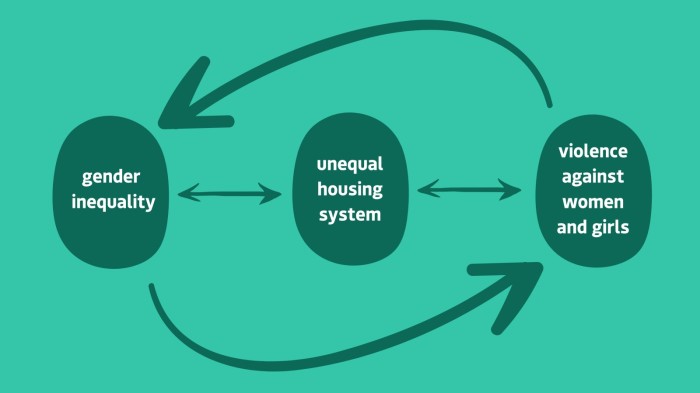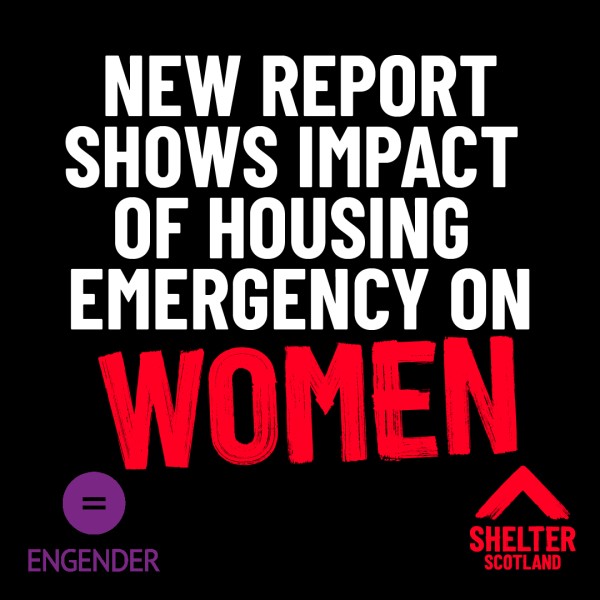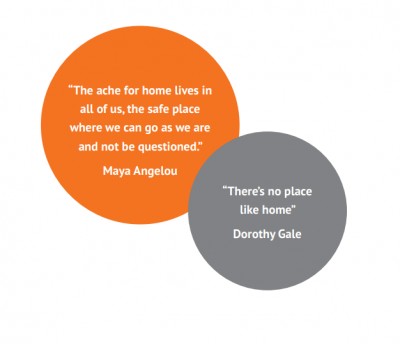Engender blog
3 Steps to Achieving Primary Prevention in Housing
We’ve published the second in our series of mini-briefings shining a spotlight on how to achieve a primary prevention approach in different areas of public policy with this new briefing highlighting why ensuring women’s access to safe, secure and quality housing is essential for advancing women’s equality and preventing VAWG once and for all.

Women’s access to housing is fundamentally shaped by structural gender inequality and other intersectional forms of marginalisation.
 In Scotland, women generally experience less favourable outcomes in the housing system than men. This deepens gender inequality not only in the housing system but also in wider society. These factors can create an enabling environment for VAWG in the home as well as in the public realm, as women participate in it less.
In Scotland, women generally experience less favourable outcomes in the housing system than men. This deepens gender inequality not only in the housing system but also in wider society. These factors can create an enabling environment for VAWG in the home as well as in the public realm, as women participate in it less.
When we talk about primary prevention of VAWG, we’re talking about preventing this violence from happening in the first place. Evidence shows the best way to do this is to tackle the root cause of this violence: gender inequality. Therefore, ensuring women’s access to safe, secure and quality housing is essential for advancing women’s equality and preventing VAWG once and for all.
Without access to safe, secure and affordable housing, women’s living standards, economic and social opportunities - as well as their health and wellbeing are affected - reinforcing gender inequality, which ultimately enables VAWG. The lack of intersectional gender analysis in housing policy undermines women’s safety due to things like lack of affordable housing options, lack of safe housing options, and a lack of gender-sensitive design and planning in housing.
Our new briefing highlights Three Steps Towards Achieving a Primary Prevention Approach in Housing Policy
1. Women are equally and fairly represented in policy-making roles
- Improve women’s pathways and career progression opportunities, particularly for minoritised women, in the housing sector
- Ensure inclusive working environments in the housing sector by implementing flexible working procedures,
anti-discrimination and harassment policies and women’s leadership initiatives
2. Policymakers consistently apply intersectional gender analysis in their work
- Collect and publish intersectional gender-sensitive sexdisaggregated data on women’s experiencing housing,
including for the Scottish Household Survey and Scottish Housing Condition Survey - Ensure Equality Impact Assessments are conducted at the outset of new housing policies and that these are
informed by intersectional gender-sensitive data on housing issues
3. Policymakers mainstream primary prevention in all areas of their work
- Increase opportunities for co-designing housing developments with women, especially those with lived experience of VAWG
- Embed women’s safety considerations into housing planning and design and decisions about the housing system, including on social security, service provision and housing legislation
Find out more in our new briefing here and follow us on social media to get the latest news on other briefings in the series, coming soon!
Broken and biased: new report shows impact of housing emergency on women
A new report published today by Shelter Scotland and Engender shines a light on the disproportionate impact of the housing emergency on women, and the additional barriers they face in accessing safe, secure, affordable, housing.

The report, released on Challenge Poverty Week’s Housing Day, shows that the higher rates of poverty among women and their greater reliance on social security benefits restricts their access to housing, with barriers being particularly pronounced for minoritised women.
It also sets out that homelessness services in Scotland are often unequipped to respond to women’s specific needs, particularly those fleeing domestic abuse. Women’s caring responsibilities and concerns over safety also create additional requirements for the type of temporary homeless accommodation that they need to access, which local services too often fail to meet.
Calling for action to address the housing emergency from a gendered perspective, the report makes a series of recommendations, including:
- Improve women’s access to safe, secure, and affordable homes by increasing the supply of social housing.
- Changes to social security to tackle women’s economic inequality, including the establishment of a ‘fund to leave’ for women experiencing domestic abuse.
- Adopting a gendered approach to the allocation and supply of temporary accommodation, taking particular account of women’s needs with regards to gender-based violence and childcare responsibilities.
- Investment in research and improved data collection to ensure women’s homelessness, including those with no recourse to public funds, is better understood and not ‘hidden’ from official monitoring.
The report argues that decades of underinvestment in social homes combined with years of austerity has created a housing system which is not only broken but biased as well.
Shelter Scotland Director, Alison Watson, said:
“This report sets out in the clearest terms the specific and disproportionate harm done to women by the housing emergency.
“Following on from the devastating homelessness figures published recently, the report is a timely reminder that Scotland’s housing system is not only utterly broken, but also biased as well.
“We know that when it comes to housing councils are breaking the law on an industrial scale, denying support to those who need it and are entitled to it; for a woman fleeing domestic violence the consequences of being turned away could be utterly catastrophic.
“Childcaring responsibilities are also far more likely to fall to women, so growing child homelessness will of course have a hugely disproportionate impact on women in Scotland.
“Scotland’s housing emergency is devastating the lives of women every day; every level of government has a responsibility to act and to heed the recommendations in this report.”
Engender’s Executive Director, Catherine Murphy, said:
“Our report with Shelter Scotland demonstrates the multiple barriers that our current housing system stacks in front of women, and the shocking ways it ignores their specific needs, pushing women into cycles of poverty and instability.
“The situation is even worse for women dealing with multiple layers of inequality. BME, disabled, and refugee women, lone parents, and those with caring responsibilities, often face relentless difficulty in securing stable housing.
“The official homelessness statistics tell us only a fraction of the story, as they fail to capture the complexity of women’s experiences, leaving them ‘hidden’ from our understanding of the problem.
“The recent pilot fund for women experiencing domestic abuse is a positive step, but it barely scratches the surface of what’s needed to address the housing emergency women face.
“Any serious response to Scotland’s housing crisis must start with acknowledging the deep gender bias in the system and taking targeted action to improve women’s access to safe, secure, and affordable homes.”
You can read the full report here, and come along to our joint webinar on 31st October to find out more about the action required to address the housing emergency from a gendered perspective. Book your free place here.
Cost of Living Crisis: The financial impact on women's access to housing
-400.png)
As part of our blog series on the cost of living crisis, Dr Melissa Espinoza looks at how a national/global crisis can exacerbate existing barriers for specific populations, and how the current financial crisis interacts with women's experiences of housing and homelessness.
When discussing the financial crisis, we must consider the difficulties of often overlooked populations. For some, the financial crisis will be a temporary and challenging time, but not a long-term way of living. Many people had already long been struggling to survive. They were already operating in crisis mode before the financial crisis. For many, the financial and housing rental crises have been years in the making.
Covid-19 is a clear example of how a national/global crisis can exacerbate existing barriers for specific populations. In other words, an increased cost of living always hits the poorest first and hardest. According to a recent report by the Women’s Budget Group (WBG), “[o]ver a decade of austerity policies, low wage rises and cuts to social security have left many people in poverty. While the richest households saved money during the pandemic, the poorest fell further into debt, with no cushion to cope with rising prices now.” Hence, many bought new homes while many people also could no longer afford their rents during the pandemic. The media conversations about the cost of living focus on households who are newly experiencing financial burdens due to the cost of living rises. However, many renters and people living in temporary accommodations struggle to keep a roof over their heads and escape the cycle of living paycheck to paycheck. Even more difficult would be for people to move into affordable accommodation after experiencing homelessness.
GUEST POST: Gender-Based Violence Policies at the Local Authority Level Part 2
Today we're publishing the next in a series of blogs from two student placements Engender is hosting from the University of Strathclyde Applied Gender Studies and Research Methods course. These blogs explore women's representation and decision-making around women's equality in local authorities across Scotland. You can see other blogs in the series here.
In 2020 Jennifer Robinson graduated with an honours degree in Society Politics and Policy from the University of the West of Scotland. She is now undertaking a Masters in Applied Gender Studies and Research Methods with a particular interest in feminist disability studies. She has previously written for the Glasgow Women’s Library and you can find her tweeting about feminism and disability on twitter @JenRobinson95.
-400.png)
As part of my Msc Applied Gender Studies and Research Methods I am undertaking a placement with Engender to research gender equality within Renfrewshire Council and Edinburgh Council. In my previous blog post I explored Renfrewshire council’s gender-based violence policies and funding decisions. In my final blog post I will outline Edinburgh Council’s Domestic Abuse Housing Policy, their council budget and transport policies.
The invisible women in Scotland’s housing system

Housing and homelessness policy in Scotland is ignoring the specific experiences and needs of women according to a new report from Engender. Their research found that, despite both international human rights obligations and the Scottish Government’s own commitment to housing rights, half of the population is almost entirely absent from any briefings, research, and action plans.
The report highlights that while women in Scotland make up the majority of lone parents and carers, are far more likely to be living in poverty, and spend a far higher proportion of their income on accommodation than men, they are not represented in the discourse around housing. Homelessness, too, is repeatedly seen as a problem predominantly affecting men, despite the fact women’s homelessness simply looks different to men’s – rough-sleeping in less busy areas for safety, hiding their homelessness for fear of losing children, and (re)entering abusive housing situations.
Downloads
 Engender Briefing: Pension Credit Entitlement Changes
From 15 May 2019, new changes will be introduced which will require couples where one partner has reached state pension age and one has not (‘mixed age couples’) to claim universal credit (UC) instead of Pension Credit.
Engender Briefing: Pension Credit Entitlement Changes
From 15 May 2019, new changes will be introduced which will require couples where one partner has reached state pension age and one has not (‘mixed age couples’) to claim universal credit (UC) instead of Pension Credit.
 Engender Parliamentary Briefing: Condemnation of Misogyny, Racism, Harassment and Sexism
Engender welcomes this Scottish Parliament Debate on Condemnation of Misogyny, Racism, Harassment and Sexism and the opportunity to raise awareness of the ways in which women in Scotland’s inequality contributes to gender-based violence.
Engender Parliamentary Briefing: Condemnation of Misogyny, Racism, Harassment and Sexism
Engender welcomes this Scottish Parliament Debate on Condemnation of Misogyny, Racism, Harassment and Sexism and the opportunity to raise awareness of the ways in which women in Scotland’s inequality contributes to gender-based violence.
 Gender Matters in Social Security: Individual Payments of Universal Credit
A paper calling on the Scottish Government to automatically split payments of Universal Credit between couples, once this power is devolved to the Scottish Parliament.
Gender Matters in Social Security: Individual Payments of Universal Credit
A paper calling on the Scottish Government to automatically split payments of Universal Credit between couples, once this power is devolved to the Scottish Parliament.
 Gender Matters Manifesto: Twenty for 2016
This manifesto sets out measures that, with political will, can be taken over the next parliamentary term in pursuit of these goals.
Gender Matters Manifesto: Twenty for 2016
This manifesto sets out measures that, with political will, can be taken over the next parliamentary term in pursuit of these goals.
 Scottish NGO Briefing for UN Special Rapporteur on Violence Against Women
Joint briefing paper for the UN Rapporteur on Violence Against Women.
Scottish NGO Briefing for UN Special Rapporteur on Violence Against Women
Joint briefing paper for the UN Rapporteur on Violence Against Women.

Newsletter
Sign up to receive our newsletter here:
Sign up to our mailing list
Receive key feminist updates direct to your inbox: